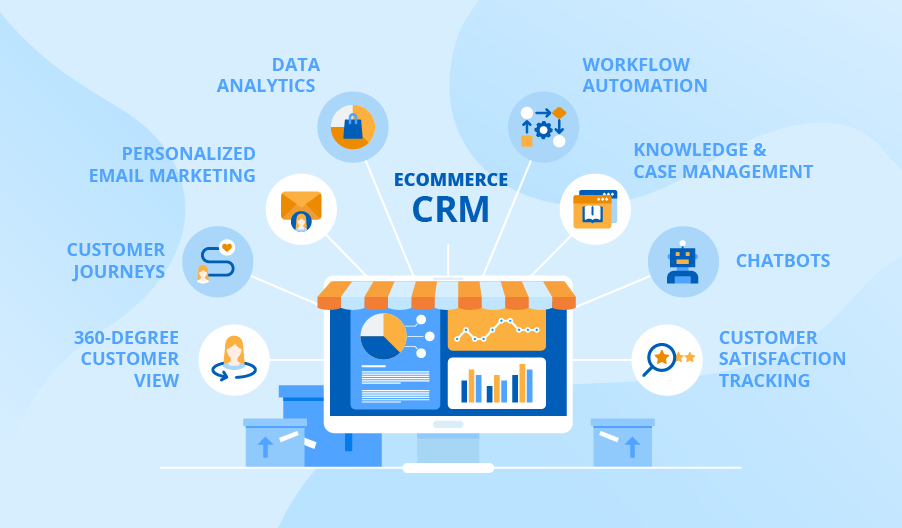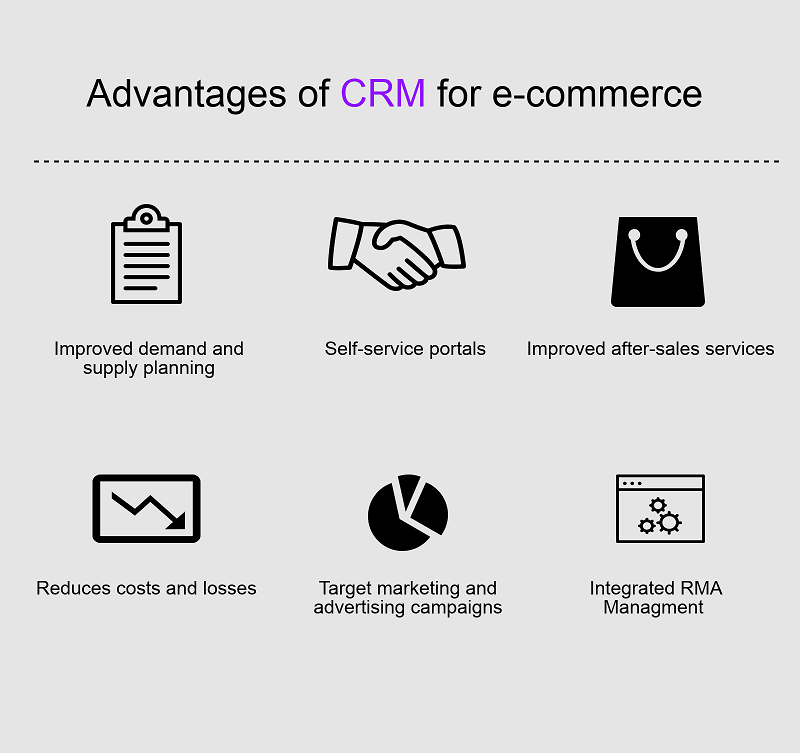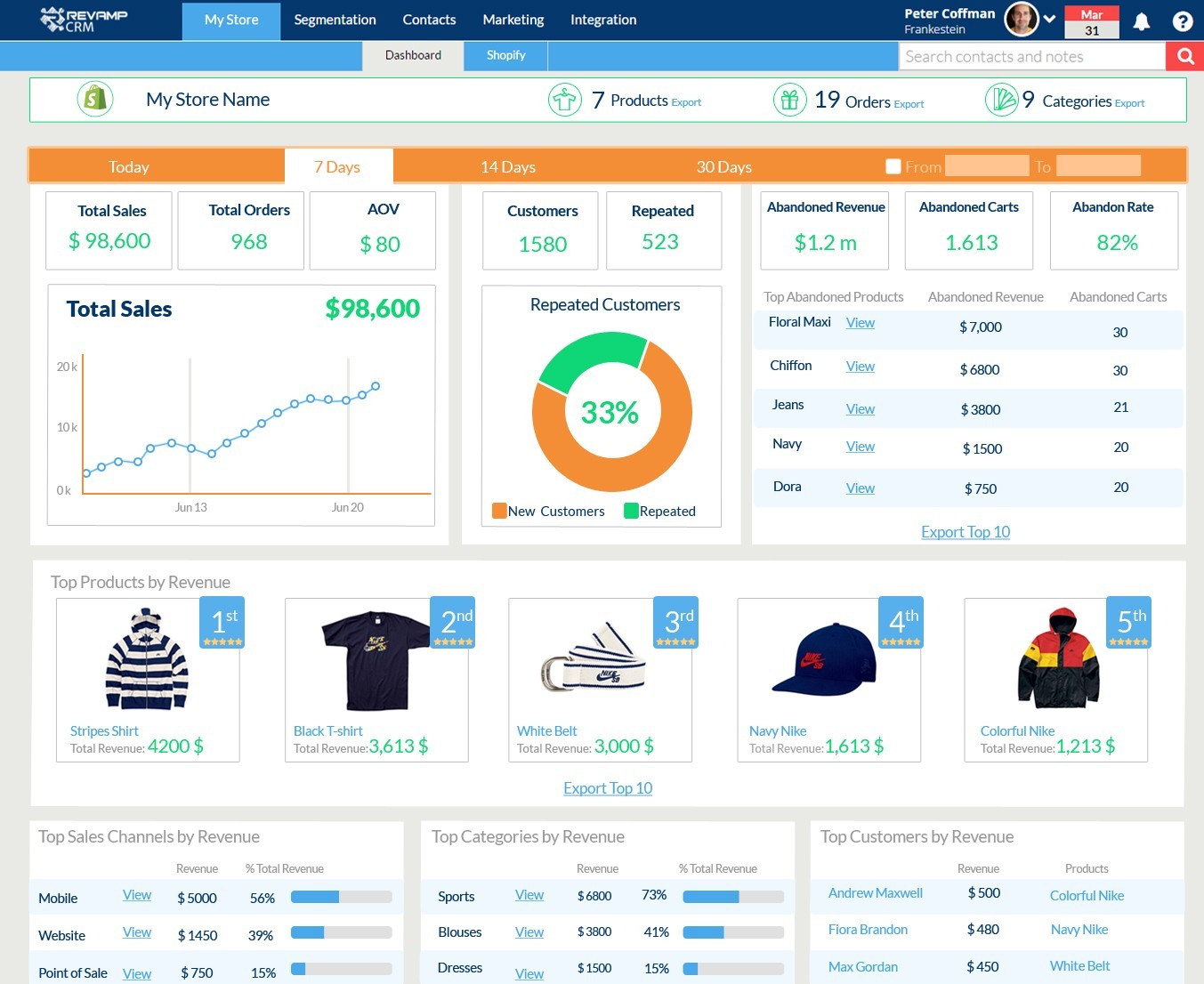Crm for e commerce – CRM for e-commerce has revolutionized the way businesses interact with their customers online, empowering them to deliver personalized experiences that foster loyalty and drive sales. By leveraging customer data and integrating it into a comprehensive CRM system, e-commerce businesses can gain invaluable insights into their customers’ preferences, behaviors, and purchase history.
This allows them to tailor marketing campaigns, provide exceptional customer support, and create targeted promotions that resonate with their specific needs. As a result, CRM has become an indispensable tool for e-commerce businesses looking to enhance customer engagement, increase conversions, and build lasting relationships.
Understanding CRM for E-commerce

Customer Relationship Management (CRM) is a crucial aspect of e-commerce that focuses on managing and nurturing customer interactions throughout their lifecycle. By implementing a CRM, e-commerce businesses can gain valuable insights into customer behavior, preferences, and purchase history, enabling them to tailor personalized experiences and drive customer loyalty.
Implementing a CRM for e-commerce businesses offers numerous benefits, including improved customer satisfaction, increased sales and revenue, enhanced marketing effectiveness, streamlined customer support, and improved operational efficiency.
Key Features and Functionalities of an E-commerce CRM
E-commerce CRMs typically offer a range of features and functionalities that cater specifically to the needs of online businesses. These include:
- Customer Segmentation:Allows businesses to categorize customers based on demographics, purchase history, behavior, and other relevant criteria.
- Personalized Marketing:Enables businesses to create targeted marketing campaigns based on customer preferences and behavior, fostering engagement and conversions.
- Sales Management:Provides tools for managing sales pipelines, tracking customer interactions, and automating sales processes to enhance productivity.
- Customer Support:Offers a centralized platform for managing customer inquiries, providing prompt and efficient support across multiple channels.
- Data Analytics:Provides comprehensive reporting and analytics to help businesses understand customer behavior, identify trends, and make informed decisions.
Choosing the Right CRM for E-commerce

Selecting the optimal CRM for an e-commerce business necessitates careful consideration of specific factors that align with the unique requirements of this industry. These factors include the ability to manage customer data, track interactions, automate marketing campaigns, and integrate with other business systems.
Factors to Consider
- Customer Data Management:The CRM should effectively capture, store, and organize customer information, including contact details, purchase history, preferences, and communication history.
- Interaction Tracking:The CRM should provide insights into customer interactions across multiple channels, such as website visits, email campaigns, and social media engagement.
- Marketing Automation:The CRM should enable businesses to automate marketing campaigns, including email marketing, personalized recommendations, and targeted advertising.
- Integrations:The CRM should integrate seamlessly with other business systems, such as e-commerce platforms, payment gateways, and shipping providers.
Comparing CRM Solutions
When comparing different CRM solutions, businesses should evaluate the following aspects:
- Features:Assess the specific features offered by each CRM, ensuring they meet the business’s requirements for customer data management, interaction tracking, marketing automation, and integrations.
- Pricing:Consider the pricing structure of each CRM, including subscription fees, implementation costs, and any additional charges for specific features.
- Integrations:Evaluate the CRM’s ability to integrate with other business systems that are essential for the e-commerce operation.
Selecting the Most Suitable CRM
To select the most suitable CRM, businesses should follow these steps:
- Define Business Needs:Clearly identify the specific requirements of the business in terms of customer data management, interaction tracking, marketing automation, and integrations.
- Research and Compare:Conduct thorough research on different CRM solutions, comparing their features, pricing, and integrations.
- Request Demos and Free Trials:Engage with CRM vendors to request demos and free trials to experience the software firsthand and assess its functionality.
- Seek Expert Advice:Consult with industry experts or CRM consultants to gain insights and recommendations based on the business’s specific needs.
- Make an Informed Decision:After careful consideration of the factors discussed, make an informed decision that aligns with the business’s goals and objectives.
Implementing and Using an E-commerce CRM: Crm For E Commerce

Implementing an e-commerce CRM involves several key steps:
- Define your business objectives:Determine the specific goals you want to achieve with your CRM, such as improving customer satisfaction, increasing sales, or streamlining marketing campaigns.
- Choose the right CRM software:Research and compare different CRM solutions to find one that aligns with your business needs, budget, and technical capabilities.
- Integrate the CRM with your other business systems:Connect the CRM to your e-commerce platform, marketing automation tools, and other relevant systems to ensure seamless data flow.
- Train your team:Provide comprehensive training to your employees on how to use the CRM effectively and maximize its benefits.
- Monitor and measure results:Regularly track key metrics to evaluate the effectiveness of your CRM and make adjustments as needed.
Integrating the CRM with Other Business Systems
Integrating your e-commerce CRM with other business systems is crucial for maximizing its functionality. Here’s how to approach this process:
- Map out your data flows:Identify the data that needs to be shared between the CRM and other systems, such as customer information, order history, and marketing campaign results.
- Choose the right integration method:Determine the best way to connect the systems, such as using APIs, webhooks, or data connectors.
- Test and troubleshoot:Thoroughly test the integration to ensure data is flowing accurately and seamlessly between the systems.
Tips for Maximizing the Effectiveness of an E-commerce CRM
To maximize the effectiveness of your e-commerce CRM, consider the following tips:
- Personalize customer experiences:Use the CRM to track customer preferences, purchase history, and interactions to deliver personalized marketing campaigns and support experiences.
- Automate tasks:Leverage the CRM’s automation features to streamline tasks such as sending follow-up emails, generating reports, and assigning leads.
- Analyze data to gain insights:Regularly analyze data from the CRM to identify trends, improve customer segmentation, and make informed business decisions.
- Continuously improve:Regularly review your CRM implementation and make adjustments based on feedback from your team and customers to ensure it remains effective and aligned with your business goals.
Using CRM Data to Improve E-commerce Marketing

CRM data is a goldmine of information that can be used to improve e-commerce marketing campaigns. By understanding your customers’ demographics, preferences, and behavior, you can create more targeted and personalized marketing campaigns that are more likely to convert.
Segmenting Customers
One of the most important ways to use CRM data is to segment your customers. This means dividing your customers into smaller groups based on shared characteristics, such as demographics, purchase history, or browsing behavior. By segmenting your customers, you can create more targeted marketing campaigns that are tailored to the specific needs of each group.
Personalizing Marketing Campaigns
Once you have segmented your customers, you can start to personalize your marketing campaigns. This means using CRM data to tailor your marketing messages to each individual customer. For example, you can send personalized emails with product recommendations based on their purchase history, or you can create targeted ads that are relevant to their interests.
Examples of Successful E-commerce Marketing Strategies that Leverage CRM Data
Here are a few examples of successful e-commerce marketing strategies that leverage CRM data:
- Amazon uses CRM data to personalize its product recommendations. When you visit Amazon’s website, you’ll see a list of products that are tailored to your interests based on your purchase history and browsing behavior.
- Netflix uses CRM data to personalize its movie recommendations. When you log into Netflix, you’ll see a list of movies that are tailored to your interests based on your viewing history.
- Starbucks uses CRM data to personalize its rewards program. When you join Starbucks’ rewards program, you’ll earn points for every purchase you make. You can then redeem those points for free drinks, food, or merchandise.
Using CRM Data to Improve Customer Service
CRM data can be a goldmine for e-commerce businesses looking to improve their customer service. By tracking customer interactions, preferences, and purchase history, businesses can gain a deep understanding of their customers’ needs and provide them with personalized support.
Identifying and Resolving Customer Issues
CRM data can help businesses identify and resolve customer issues quickly and efficiently. By analyzing customer interactions, businesses can identify common pain points and develop proactive solutions. For example, if a business notices that a high number of customers are contacting support about a particular product, they can investigate the issue and provide a fix or workaround.
Examples of CRM Data Use in Customer Service
- Personalized Support:CRM data can be used to personalize customer support interactions. For example, a customer service representative can access a customer’s previous purchase history and offer recommendations for complementary products or services.
- Proactive Problem Resolution:CRM data can help businesses identify and resolve customer issues before they become major problems. For example, a business can use CRM data to track customer interactions and identify customers who have had multiple negative experiences. The business can then reach out to these customers and proactively address their concerns.
- Improved Communication:CRM data can help businesses improve communication with their customers. By tracking customer preferences, businesses can determine the best way to reach out to them. For example, if a customer prefers to communicate via email, the business can send them email updates and promotions.
Trends and Innovations in E-commerce CRM
E-commerce CRM is undergoing constant evolution, driven by emerging technologies and changing customer expectations. Here are some key trends and innovations shaping the future of e-commerce CRM:
Artificial Intelligence (AI) and Machine Learning (ML)
AI and ML are transforming e-commerce CRM by enabling businesses to automate tasks, personalize customer experiences, and gain valuable insights from customer data. For example, AI-powered chatbots can provide real-time support, while ML algorithms can analyze customer behavior to identify patterns and predict future purchases.
Omnichannel CRM, Crm for e commerce
Customers today expect a seamless experience across all channels, including online, mobile, and in-store. Omnichannel CRM integrates data from all channels to provide a unified view of the customer, enabling businesses to deliver personalized experiences regardless of the channel.
Customer Data Platforms (CDPs)
CDPs are centralized platforms that collect and unify customer data from multiple sources. They provide a comprehensive view of the customer, enabling businesses to create targeted marketing campaigns, improve customer service, and personalize the customer experience.
Predictive Analytics
Predictive analytics uses historical data to identify patterns and predict future customer behavior. This information can be used to personalize marketing campaigns, offer tailored product recommendations, and improve customer service.
Augmented Reality (AR) and Virtual Reality (VR)
AR and VR are emerging technologies that can enhance the customer experience by providing immersive and interactive experiences. For example, AR can be used to allow customers to virtually try on products, while VR can create virtual showrooms where customers can explore products in a realistic environment.
Final Thoughts
In conclusion, CRM for e-commerce is a game-changer for businesses seeking to elevate their customer interactions and drive growth. By embracing the power of customer data and implementing a robust CRM solution, e-commerce businesses can gain a competitive edge, foster customer loyalty, and ultimately achieve long-term success.